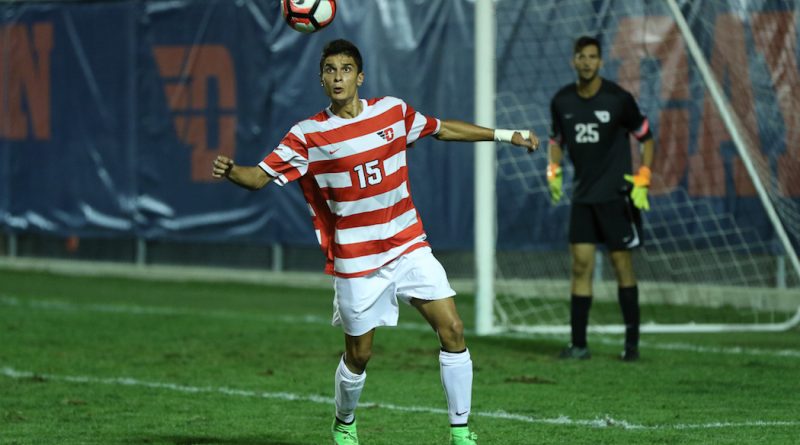Near, Far, Flyers they are: Currier Outsourcing Talent
By: Edward Perez – Staff Writer
Head coach Dennis Currier launched his 12th year managing the Dayton Flyers men’s soccer program this season. Over his career as a coach, Currier has become a veteran recruiter of international players and has been bringing players from abroad to play for his program for over 17 years. This year, his work in this discipline remains firm with 10 international players on the roster—six of them entering their first year in the UD soccer program.
Currier says his experience gives him an understanding of the journey an international student-athlete goes through when committing to his program.
“They’re all coming from 3,000 miles away, but every culture is a little bit different,” Currier said in a recent interview. “Not all the time, but most of the time they have similar characteristics from the culture they grew up in.”
Currier was referring to the fact that most of the countries the international players come from have soccer as their most beloved and popular sport.
“That [is injected] in our team and that’s really why we recruit them, plus they’re talented student-athletes,” said Currier. “It [also] allows us to find student-athletes that maybe some other colleges haven’t found.”
Currier said his work in recruiting international players remains strong here at UD because the university is attractive to many all around the world.
“On the internet, you can see the pictures, the facilities, the education, that community feel, so I think it’s a very easy adjustment for them,” Currier said. “I’ve always felt Dayton was an excellent school for international students to come and I think that’s helped us in our recruiting.”
Currier added that there are multiple programs in place to ease the adjustment process for the new international players, but he also stressed that his program leans on the current student-athletes to play a key role in this process. Over the summer, committed international players are contacted often to help them understand what they will be getting into.
“This system is so much different from what they’re used to,” Currier said. “There is an orientation that we do within the soccer program with the international students and there’s an orientation that the international student office does so they kind of get hit twice to get them prepared. Plus, you have the players that are here already. They’re educating them.”
Currier said only so much can be done before an international player actually arrives on campus and experiences the reality of being in a new environment with a set of different expectations. He used fitness as an example for this issue. Fitness, according to Currier, is not a priority in some of the programs international players have been a part of. But in college soccer, fitness is absolutely a top priority.
Freshman forward Rok Taneski, from Kranj, Slovenia, along with freshman midfielder Daniel Dos Santos, from Gland, Switzerland, verify that the fitness expectations of the program exceed what they initially expected, despite the fact that both have played for professional European clubs at the youth level, and were both called to play for their respective national teams.
Speaking of any difficulties they have had since arriving in the United States, Taneski said, “We’ve had no problems adjusting, only in practice. It’s different in quality. It’s hard. We train more, we run more.”
Junior midfielder Alvaro Navarro of Navarra, Spain touched on the differences the three have experienced from playing soccer in Europe versus here in the US.
“All was different, the type of soccer here is very different from the type of soccer in Spain,” Navarro said. “It’s all more physical, and here they don’t play the ball on the grass that much. It’s all high, with the head, and really physical, and I have to adapt to that.”
Dos Santos feels that Dayton’s style of play differs from many opposing schools, in that the team is oriented and has a set tactic to win matches.
“I think we’re lucky because we’re in a program who cares about not just kicking the ball. At least our team tries to build the play from the beginning,” Dos Santos said. “When we play against other teams they don’t care about that, they just try to kick the ball, try to fight, so now we just have to adapt.”
The three can agree that they expect to adapt easily and know that the coaches are there for them in case they need anything.
Currier says that his expectations for the international players align with the expectations he has set for the rest of the team. Yet, Currier brings attention to one of his most accomplished athletes, current Real Salt Lake Midfielder, Amass Amankona.
Amankona finished his career as an international student-athlete last spring at UD. He came over from Kumasi, Ghana and excelled both in the classroom and on the pitch. Some of his accomplishments include being named a Scholar All-American by the National Soccer Coaches Association of America, being named Atlantic 10 Conference Most Valuable Player and Midfielder of the Year, as well as First Team All-Conference and Academic All-Conference, a top 10 finalist for the Senior CLASS Award, and finishing the 2015 season as No. 23 ranked player in the nation according to Top Drawer Soccer.
Currier believes Amankona is the role model for both international and US-based players on his team, and hopes his athletes can strive to reach, if not pass, the same accomplishments.

